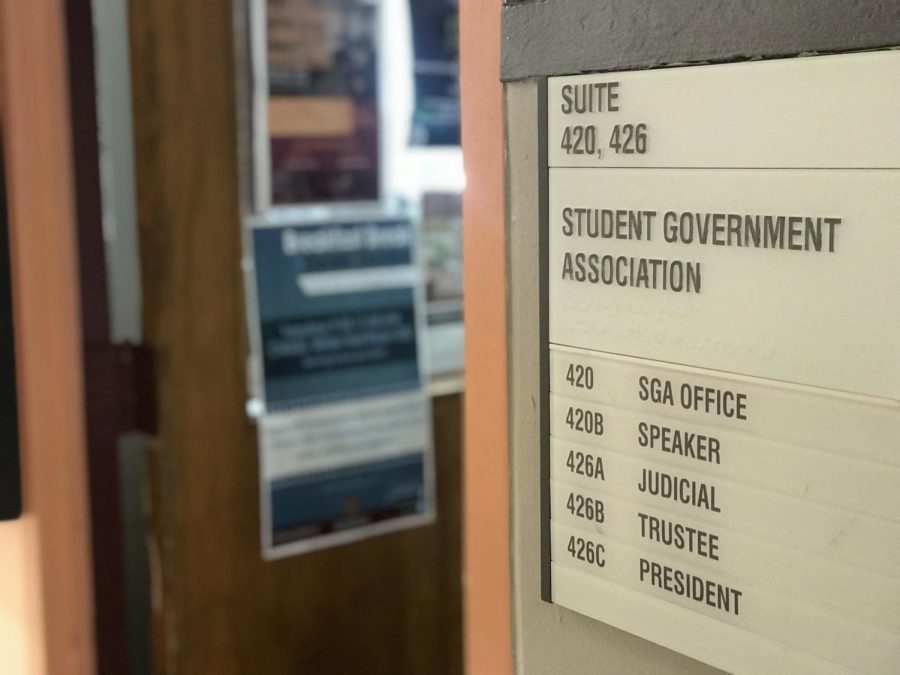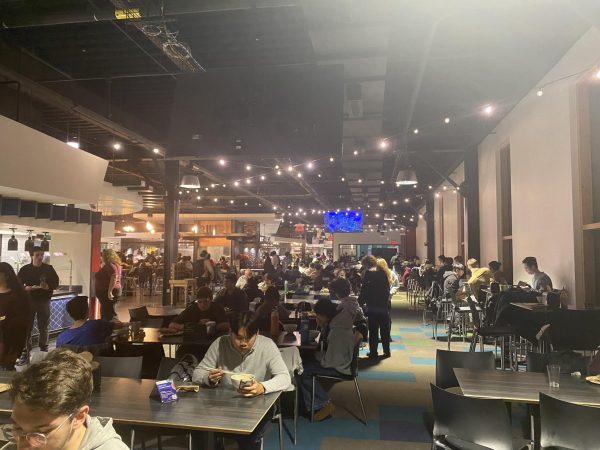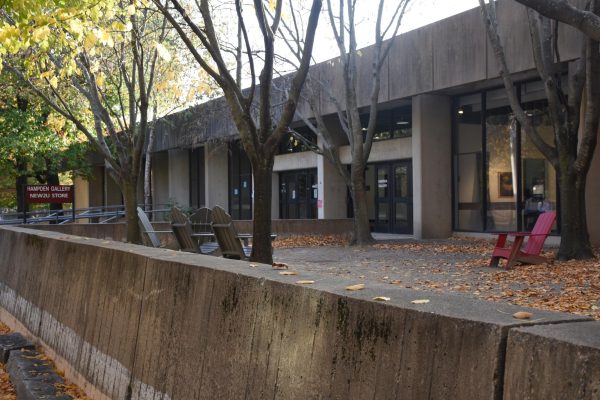Getting involved: How to run for election with the UMass SGA
AMHERST — With spring semester now in full swing, many students are back on campus and getting re-adjusted to their new schedules. Although fall is the biggest time for new enrollment in student activities, there are some organizations that run their primary recruitment in the spring.
The Student Government Association, or SGA, at The University of Massachusetts Amherst will soon begin the nominations process for prospective new members. The SGA will be starting the nominations process this week, with voting taking place later on this month.
The Amherst Wire sat down with Cobi Frongillo, SGA’s Secretary of Public Relations to find out what information someone interested in joining the SGA needs to know in order to do so.
What is the SGA?
“SGA is the governing body of the undergraduate student body. We have two main functions. One, we advocate for all students on campus. We are the go-to communicators with administration, we represent students and we are going to be the voice of students at UMass.
We have a policy on campus that any campus-wide changes that administration wants to implement has to be consulted with the Student Government Association. So we’re in regular communication with administration on that.
The other function is we oversee a $3.3 million budget, collected in the form of the student activities fee that all students pay. We finance and administer all RSOs on campus. So, if you want to be an organization on campus, you’ve got to come through student government, and if you want funding on campus, you’ve got to come through student government.
The setup of student government is three branches – executive, judicial and legislative. So we’ve got a judicial court that oversees their neutral body that would ensure that RSOs and agencies on campus are following their constitutions. We have the legislative branch that is made up of a 60-person senate, and those 60 seats are divided by grade, with roughly 15 [seats] per grade. The freshmen and sophomores have a few more. But a 60-person senate voted on by the grade represents the grade, and they’re headed by a speaker that oversees them. Then we have the executive; the president and vice president are elected together, and they appoint their cabinet.”
What positions are up for election?
“Three positions are open for students. The main one is going to be those senate seats. So, the class of 2019, who will be seniors next year, 2020, and 2021 all have senate seats open. The next class, 2022, they will have a fall election. But the spring election is going to be those three classes, electing roughly 15 senators per class.
The other open positions are president and vice president. They represent all undergraduates at UMass, anyone who pays a student activities fee. They’re going to run on a joint ticket. The current president and vice president have been there for two years, and they’re both graduating, and so that seat is running without an incumbent for the first time in a few years.
Finally, there’s a sort of unique position called the student trustee. Basically, there’s a UMass Board of Trustees that governs the five UMass campuses, and each campus gets to select one student trustee that gets to represent their campus. They all meet regularly, and two of them get to vote on the Board of Trustees. Currently, our student trustee is Derek Dunlea, and he is a voting member on the UMass Board of Trustees. He goes to meetings in Boston; he represents all members of graduate and undergraduate students of UMass.”
Editor’s Note: Each position has a term length of one year.
What does the time commitment look like for these positions?
“There’s no specific time limit. To be a senator, you’re going to have a weekly senate meeting with the entire senate body. That’s going to be every Monday, for one to three hours. Then, you’re also going to be assigned to a committee. We divide senate into a variety of committees that each have a specialization, so we have a finance committee, a ways and means committee, an undergraduate experience committee; whichever committee you’re appointed to, that’s probably going to have one more meeting per week. Sometimes two depending on the season. One large senate meeting, one small committee meeting, and then it just depends on how much time you want to put in.
To be president and vice president, it’s a job. They are employed, and typically you would cut back credits and you would prioritize your position in representing the student body — usually about 20 hours each week. Often they are meeting with administration, organizing cabinet meetings, initiating projects, and that number will obviously fluctuate depending on how much time you want to put in.
The student trustee is not a paid position, and I know that it’s a large commitment in terms of traveling to Boston and traveling to Board of Trustee meetings, and being in communication. But, it’s not a full-time job, so it’s just about how active you want to be as a trustee member on campus.”
What is the nominations process?
“Each one is going to be a little bit different. Nominations are running February 6 through February 13 this year, which is the earliest they’ve been in a while. The thought process behind that is to allow for a better transition process, especially with a new president and vice president, so they’ll have more time by the end.
To be nominated for senate, you need 50 signatures from members of your graduating class, and you fill out a nominations packet. That’s going to be available [at the SGA office] or at umass.edu/SGA/elections.
For president and vice president, you’ll need 200 signatures and you can get them from any undergraduates.
For student trustee, you need 250 signatures and those can be from graduates or undergraduates.
Those are all of the requirements to get on the ballot. You can run as a write-in, but they do not typically have success. To be on the ballot, you need to go through that nomination process. You also need to attend the Candidate meeting, and the Candidate meeting is going to be on February 16, with a makeup on February 17. You must attend one Candidate meeting and fill out the nomination packet in time in order to be eligible to be on the ballot.”
Editor’s Note: The Candidate meetings will be at 6:30 PM in Campus Center Room 162.
Do you need prior experience?
“Anyone can run, and we encourage people to run! My personal opinion is the more people are interested in running and engaging in student government, even though only a few people can sit in the actual legislative body, it improves that representation. It gets more people engaged, which improves everyone’s role as a senator. When we feel competition for seats, it pushes us to be the best at what we do. We see a lot of success, a lot of new senators, people who are passionate and can garner passion from people around them usually accelerate past incumbents in senate, which is helpful.
The only other things to know will be gone over in the Candidate meeting, how to run, procedures for campaigning, for which we have fairly strict guidelines set by a neutral elections board, who are going to be running the Candidate meeting.”
When are elections?
“You can start campaigning after you attend the Candidate meeting, and then voting is going to be February 20 through February 23, and that’s going to be on Campus Pulse.”
What if people have questions?
“In general, if you want to get involved with SGA, the person to reach out to would be sgaoutreach@umass.edu. That is our Outreach and Development Chair Stephanie Margolis. There are often open seats, or other ways to get involved with Student Government, either as committee assistants or office manager, or undersecretaries, contact Stephanie if you want to get involved.”
Talking to Current Members
We also reached out to current members of the SGA to see what they had to say about being a member of UMass’ SGA.
“Being the vice president of the SGA has had a huge impact on my experience at UMass. I have been able to create space to elevate voices that have not traditionally been well represented by the SGA. I have been able to better understand a lot of problems in higher education in a much more nuanced way. It has given me a lot of opportunities to grow not only professionally but personally. I have been able to build relationships with incredible mentors who have challenged me and opened up incredible opportunities. It, however, is not always rainbows and butterflies as a student leader — it definitely has been compromise that moves this campus along. Learning how to negotiate the needs of students with the realities of state funding has been one of the largest challenges I have had. My life has had a much more public aspect that I did not anticipate since my appointment but its important to me that students recognize a face they can go to when they have an idea or problem. It was important for me to be here so that I could build bridges between student groups and the campus’ governance body and represent a different student experience.” -Lily Wallace, vice president of the SGA.
“Serving on the Board means speaking up and representing all undergraduate and graduate students on important matters such as tuition and fee increases. It offers unparalleled access to the UMass President’s Office, as you are the central communication between your campus and the President’s Office.” -Derek Dunlea, student trustee.
“Running for a senate position within the SGA gives students the ability to amplify their voice, and to enact real campus and larger change. I have used the platform to advocate for low-income students and those of similar marginalized backgrounds, to provide greater support in pushing for affordable higher education. As someone who has lived in deep poverty as the oldest of my six other siblings, I understand the sense of powerlessness that one can feel at the hands of larger societal problems that have such a human impact. However, it is my belief that when we funnel these experiences into advocacy, we together can start the conversation on often ignored issues. The Student Government Association gives to students this avenue of change, and it is one that has changed the entire course of my college career, giving me back the voice that I had for so long thought to be nonexistent.” -Tim Scalona, SGA senator.
Email Elissa at eborden@umass.edu, or follow her on Twitter @journELISSt.












